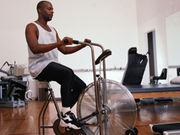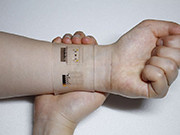MODY1 Form of Diabetes May Require Alternate Treatment
Mutations in HNFα cause Mature-Onset Diabetes of the Young 1, with diminished GSIS
Number of Seniors Mixing Medications, Supplements Rising
Many do not tell their doctors, putting them at risk for dangerous drug interactions
Stress Management Could Help Optimize Cardiac Rehab
When added to recovery regimen, fewer patients had heart attacks, strokes, or died
Sweat-Sensing Device Designed to Regulate Glucose Levels
Experimental technology senses blood glucose and delivers medicine with microneedles
Drug Combo Reduces Polyps in Familial Adenomatous Polyposis
Findings for sulindac twice daily and erlotinib daily
Review Questions Influence of Alcohol Consumption on Life Span
Researchers say previous findings don't account for those who abstain from alcohol because of illness
Mindful Meditation Technique May Help Ease Chronic Low Back Pain
Researchers find it more effective than cognitive behavioral therapy and usual care
FDA Orders Enhanced Warning Labels on Opioid Pain Medications
New labeling rules mostly aimed at immediate-release versions of opioids
Wrestling Wins for Most High School Athletic Skin Infections
Overall rate of skin infections is 2.27 per 100,000 athlete exposures; mostly bacterial and tinea
ACC: Faster Absorption of Crushed Prasugrel in STEMI
Crushed prasugrel led to reduction in P2Y12 reaction units for up to four hours post-loading dose



















